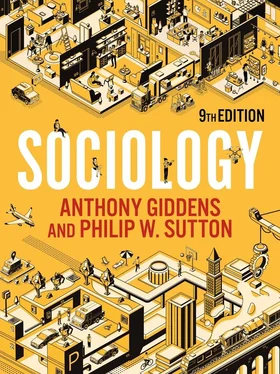Next, we look at some of the various research methods sociologists commonly employ in their work (see table 2.2).
The approaches of both Laud Humphreys and Li and his colleagues in China were forms of ethnography, a type of fieldwork, or first-hand study of people, using participant observation and/or interviews as the main research methods. Here, the investigator hangs out, works or lives with a group, organization or community and sometimes plays a direct part in their activities.
Where it is successful, ethnography provides information on the behaviour of people in groups, organizations and communities as well as on how those people understand their own behaviour. Once we see how things look from inside a given group, we can gain a better understanding, not only of that group but also of social processes that transcend the situation under study. Ethnography is one of a number of qualitative research methods used in sociology that aim to gain an in-depth knowledge and understanding of relatively small-scale social phenomena.
In the traditional works of ethnography, accounts were presented without much information about the researchers themselves being included, as it was thought that an ethnographer could present objective accounts of the societies they studied. In more recent years, ethnographers have increasingly discussed themselves and the nature of their connection to the people under study. Sometimes this reflexivity might be a matter of trying to consider how one’s own ethnicity, class or gender has influenced or affected the work, or how the power differences between observer and observed have impacted on the dialogue between them.
Table 2.2 Four widely used methods in sociological research
| Research method |
Strengths |
Limitations |
| Fieldwork |
Usually generates richer and more in-depth information than other methods. |
Only successful with smaller groups or communities. |
|
Ethnography can provide a better understanding of social processes. |
Findings might apply only to the groups studied. Not easy to generalize on the basis of a single fieldwork study. |
| Surveys |
Make possible the efficient collection of data on large numbers of people. |
The material gathered may be superficial; where a questionnaire is highly standardized, important differences between respondents’ viewpoints may be glossed over. |
|
Allow for precise comparisons to be made between the answers of respondents. |
Responses may be what people profess to believe rather than what they actually believe. |
| Experiments |
The influence of specific variables can be controlled by the investigator. |
Many aspects of social life cannot be brought into the laboratory. |
|
Are usually easier for subsequent researchers to repeat. |
The responses of those studied may be affected by their experimental situation. |
| Documentary research |
Can provide source of in-depth materials as well as data on large numbers, depending on the type of documents studied. |
The researcher is dependent on the sources that exist, which may be partial. |
|
Is often essential when a study is either wholly historical or has a defined historical dimension. |
The sources may be difficult to interpret in terms of how far they represent real tendencies, as in the case of some official statistics. |
Ethnographic studies do have limitations. Only fairly small groups or communities can be studied, and much depends on the skill of the individual researcher in gaining the confidence of the people involved. Without this skill the research is unlikely to get off the ground at all. The reverse is also possible. A researcher could begin to identify so closely with the group that he or she becomes too much of an ‘insider’ and loses the perspective of an outside observer. When so much rests on the skills of a particular individual, the study becomes hard to reproduce and thus the reliability of the findings may be called into question.
Sociologists also make use of focus groups, previously the preserve of marketing agencies and opinion pollsters. Focus groups are essentially facilitated ‘group discussions’ in which a small group of specifically selected individuals are gathered together to discuss a subject and exchange views. The researcher acts as moderator but also asks specific questions relating to the research study in order to direct the discussion. Because of their interactive and flexible nature, focus groups allow possible misunderstandings to be clarified, thereby increasing the validity of findings. However, critics point out that the researcher in a focus group is more participant than detached observer and may well influence the responses. There is therefore a danger that participants will perform according to the researcher’s expectations, though this issue is not unique to the focus group method and is something that all researchers have to consider.

Interpreting field studies usually involves problems of generalization. Since only a small number of people are studied, we cannot be sure that what is found in one context will apply in another, or even that two researchers would come to the same conclusions when studying the same group. This is less of a problem in large-scale survey research. In a survey, questionnaires may be sent out or administered directly in interviews to a selected group of people – sometimes several thousand. Sociologists refer to this group of people, whatever its size, as a sample.
While ethnographic work is well suited to in-depth studies of small slices of social life, survey research tends to produce information that is less detailed but can be applied over a broader area. Surveys are the most widely used type of quantitative research method, allowing social phenomena to be measured and then analysed using mathematical models and statistical techniques. Many government bodies and private polling agencies make extensive use of surveys to gain knowledge of people’s attitudes and creating an accurate picture of the shape, size and diversity of a society’s population would be quite impossible without such survey research.
Often sociologists are interested in the characteristics of large numbers of individuals – for example, the political attitudes of the population of Australia. It would be impossible to involve all 25 million people directly, so in such situations researchers engage in sampling – concentrating on a small proportion – a sample – of this overall population. One can usually be confident that the results from a population sample, as long as it is properly chosen, can be generalized to the total population. Studies of only 2,000 to 3,000 voters, for instance, can give a very accurate indication of the attitudes and voting intentions of the entire population. But, to achieve such accuracy, a sample must be representative – that is, the group of individuals studied must be typical of the population as a whole. Representative sampling is more complex than it may appear, and statisticians have developed rules for working out the correct size and nature of samples.
A particularly important procedure used to ensure that a sample is representative is random sampling, in which a sample is chosen so that every member of the population has the same probability of being included. The most sophisticated way of obtaining a random sample is to give each member of the population a number and then use a computer to generate a random list from which the sample is derived – for instance, by picking every tenth number.
Читать дальше













